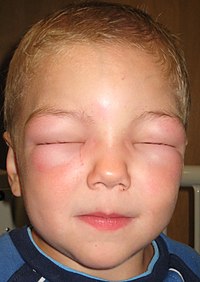
Reviewing clinical considerations and guideline recommendations of C1 inhibitor prophylaxis for hereditary angioedema
Sign Up to like & getrecommendations! Published in 2022 at "Clinical and Translational Allergy"
DOI: 10.1002/clt2.12092
Abstract: Abstract Background Hereditary angioedema (HAE), a rare disease that is characterized by painful and recurring non‐allergic swelling episodes, is caused by the deficiency or dysfunction of C1 inhibitor (C1INH) protein. A comprehensive HAE management plan… read more here.
Keywords: hae; hereditary angioedema; clinical considerations; guideline recommendations ... See more keywords

Comorbidities in hereditary angioedema—A population‐based cohort study
Sign Up to like & getrecommendations! Published in 2022 at "Clinical and Translational Allergy"
DOI: 10.1002/clt2.12135
Abstract: Abstract Background In hereditary angioedema (HAE), low levels (type 1) or defect in function (type 2) of the serine‐protease inhibitor C1 Inhibitor protein results in activation of the classical pathway of the complement system as… read more here.
Keywords: hereditary angioedema; hae patients; among hae; risk ... See more keywords

Current challenges and future opportunities in patient‐focused management of hereditary angioedema: A narrative review
Sign Up to like & getrecommendations! Published in 2023 at "Clinical and Translational Allergy"
DOI: 10.1002/clt2.12243
Abstract: Abstract Patients with hereditary angioedema (HAE) experience a high burden of disease due to unpredictable, painful, disfiguring, and potentially life‐threatening HAE attacks. Multiple HAE‐specific medications for the on‐demand treatment, short‐term and long‐term prophylaxis of HAE… read more here.
Keywords: hae; hereditary angioedema; hae management; challenges future ... See more keywords

First Analysis of SERPING1 Gene in Patients with Hereditary Angioedema in Colombia Reveals Two Genotypic Variants in a Highly Symptomatic Individual
Sign Up to like & getrecommendations! Published in 2018 at "Journal of Clinical Immunology"
DOI: 10.1007/s10875-018-0491-1
Abstract: Hereditary angioedema (HAE) is a heterogeneous genetic disease caused by a deficit in C1 inhibitor (C1-INH) and clinically characterized by sudden events of edema, swelling, and pruritus. Here, we describe the first SERPING1 genotyping in… read more here.
Keywords: serping1 gene; hereditary angioedema; analysis serping1; gene ... See more keywords

Recognition and Management of Hereditary Angioedema: Best Practices for Dermatologists
Sign Up to like & getrecommendations! Published in 2021 at "Dermatology and Therapy"
DOI: 10.1007/s13555-021-00593-x
Abstract: The goal of this article is to discuss the importance of differentiating hereditary angioedema (HAE) from other types of angioedema, describe advances in HAE management, especially long-term prophylaxis (LTP), and offer practical recommendations for dermatologists.… read more here.
Keywords: management; hereditary angioedema; management hereditary; recognition management ... See more keywords

Repeated attacks of type III hereditary angioedema with factor XII mutation during pregnancy.
Sign Up to like & getrecommendations! Published in 2018 at "International journal of obstetric anesthesia"
DOI: 10.1016/j.ijoa.2018.07.003
Abstract: In type III hereditary angioedema (HAE type III), the phenotype is the same as type I and type II disease, but the level and function of C1-esterase inhibitor (C1-INH) is normal. Hereditary angioedema type III… read more here.
Keywords: pregnancy; factor xii; hereditary angioedema; type ... See more keywords

Hereditary angioedema attack: what happens to vasoactive mediators?
Sign Up to like & getrecommendations! Published in 2019 at "International immunopharmacology"
DOI: 10.1016/j.intimp.2019.106079
Abstract: Hereditary angioedema is a disabling, life-threatening condition caused by deficiency (type I) or dysfunction (type II) of the C1 inhibitor protein (C1-INH-HAE) leading to bradykinin accumulation and recurrent episodes of edema attack. Vascular leakage is… read more here.
Keywords: attack; remission; vasoactive mediators; patients inh ... See more keywords

Changes of coagulation parameters during erythema marginatum in patients with hereditary angioedema.
Sign Up to like & getrecommendations! Published in 2020 at "International immunopharmacology"
DOI: 10.1016/j.intimp.2020.106293
Abstract: BACKGROUND Hereditary angioedema (HAE) with C1-inhibitor deficiency (C1-INH-HAE) is characterized by recurrent episodes of subcutaneous/submucosal edema, which may be preceded by erythema marginatum (EM) as a prodromal symptom. Our aim was to analyze the changes… read more here.
Keywords: erythema marginatum; symptom free; hae attacks; hereditary angioedema ... See more keywords

A robust multiplexed assay to quantify C1-inhibitor, C1q, and C4 proteins for in vitro diagnosis of hereditary angioedema from dried blood spot.
Sign Up to like & getrecommendations! Published in 2020 at "Journal of pharmaceutical and biomedical analysis"
DOI: 10.1016/j.jpba.2020.113844
Abstract: Hereditary angioedema (HAE) is a rare genetic disease caused by deficiency or dysfunction of C1 esterase inhibitor (C1-INH). Plasma C1-INH activity and concentrations of C1-INH and complement components 1q and 4 (C1q, C4) are critical… read more here.
Keywords: multiplexed assay; blood spot; c1q; dried blood ... See more keywords

Prophylactic use of an anti-activated factor XII monoclonal antibody, garadacimab, for patients with C1-esterase inhibitor-deficient hereditary angioedema: a randomised, double-blind, placebo-controlled, phase 2 trial
Sign Up to like & getrecommendations! Published in 2022 at "The Lancet"
DOI: 10.1016/s0140-6736(21)02225-x
Abstract: BACKGROUND Hereditary angioedema is associated with dysregulation of the kallikrein-kinin system. Factor XII (FXII) is a key initiator of the kallikrein-kinin system, which produces bradykinin, a central mediator of angioedema. Garadacimab (CSL Behring) is a… read more here.
Keywords: placebo; treatment; factor xii; hereditary angioedema ... See more keywords

VP55 Health Technology Assessment Of Orphan Drugs: The Case Of Hereditary Angioedema In Italy
Sign Up to like & getrecommendations! Published in 2017 at "International Journal of Technology Assessment in Health Care"
DOI: 10.1017/s026646231700335x
Abstract: INTRODUCTION: The evaluation of orphan drugs raises both positive and normative issues. Due to the rarity of the disease, higher drug costs and greater uncertainty on effectiveness often result in incremental cost-effectiveness ratios (ICER) far… read more here.
Keywords: technology assessment; orphan drugs; hereditary angioedema; health ... See more keywords